In conversation: A French and American take on Emily in Paris
Emily (Lily Collins) in Netflix's Emily in Paris. Photo: Netflix
Emily in Paris is everywhere: causing people to rage on social media, making us dream of booking tix to Paris again (someday!) and paused on TV screens, as people WhatsApp their friends to moan about how unrealistic Emily's (Lily Collins') stratospheric social media success is - who gets 200 new followers after posting a photo of baked goods? - and then swooning over how gorgeous Frenchie Lucas Bravo (Emily's neighbour, Gabriel), is.
Critics - in the US, UK and France - have complained that it's clichéd, ridiculous, lacks diversity and is deeply culturally offensive. However, it's also totally addictive, even if people are hate-watching it, with a viewership that includes teens, their parents, and every Sex and the City fan who was excited about the premise of sex - and Pat Field styling - in another city.
For those who haven't seen it, Emily in Paris centres around Chicagoan Emily, who gets sent to Paris to work for a top French marketing agency when her boss falls pregnant. Clueless about the language and culture, she makes a series of faux pas that sees her branded a plouc (a hick) and ringarde (basic). But Paris is soooo beautiful and Emily's boss, Sylvie (Philippine Leroy-Beaulieu) and friend, Camille (Camille Razat), are soooo stylish, and the men are soooo dreamy...
One reason that Emily's got everyone talking is that it touches on the big cultural divide between France and America. Who better to discuss the show then a Frenchwoman (CW founder Eleonore Dresch) and an American, kids' editor, Jennifer Barton.
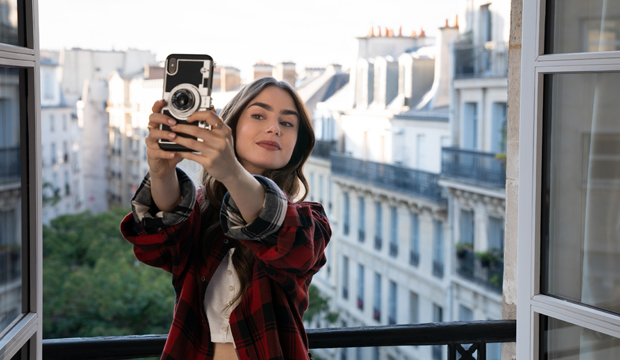
Photo: Netflix
Jen: I lived in Paris when I was 23. I studied French literature so I did my year abroad there. I was a sort of Emily figure. I worked - I was doing an internship at WWD there - I was taking acting classes at the Cours Florent doing the acting thing, so I feel I can relate to her a little bit.
I felt sad watching this that the image of Americans in Paris is brazenly going in and not trying to respect the culture or learn the language and that wasn't my approach when I lived there.
The most unrealistic thing, that I found ridiculous, was that all of the French people would be speaking English to each other in front of her. That would never happen. One of the reasons that you end up learning French and picking it up is that no one will ever concede to you in English.
Eleonore: I agree. I've noticed at parties - and there's one episode where it happens, she's invited to a party, and a Frenchwoman comes to her and talks to her in English and she's lovely and she's trying and then another Frenchwoman arrives and they start talking in French and Emily's completely out of the conversation. That's very typical of what would happen.
I thought it was interesting because at the beginning I thought, this is really unpleasant. It's unpleasant for her - I mean, she's really like la plouc, the hick, and she comes with her big smile thinking everyone is on her planet and she's told, 'Sorry darling, we couldn't care any less about you'. I think she's playing the role of the dumb girl and that's pretty harsh on the Americans. It's a bit of a caricature of how the French perceive the Americans, so it's not nice to the Americans and it's not nice to the French obviously - that's also the funny part of it.
And then as the series goes on, Sylvie, who is unbearable at the beginning, you start to like her and you start to see the other side of her, and you can see how she mellows with Emily and vice versa and how they start learning from each other. In the end, there are quite some positive moments, and the idea that the two cultures together can create something wonderful. So I don't think it's that bad, but it's obviously too extreme in many ways.
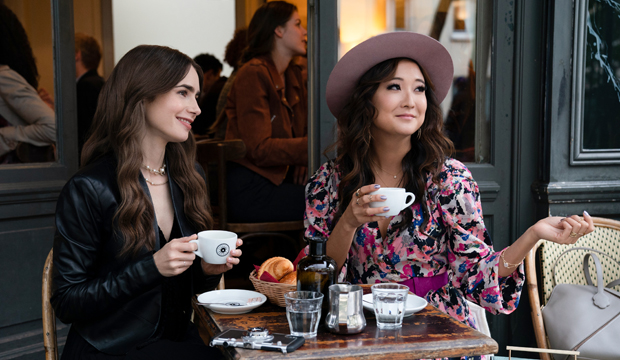
Lily Collins and Ashley Park. Photo: Netflix
Jen: Everyone's so engaged with it: Brits, Americans, the French. So on some level, even though people are hate-watching it, there is an element where people are seeing it through and there is something compelling about it.
Eleonore: I agree. Going back to my own experience - I'm not Parisian, I grew up in the south of France and I moved to Paris and lived there for five years and had a lovely time there. Then I moved to London.
What is interesting for me is when I go back to Paris where I have family and friends, when I'm invited to parties, I realise - because obviously I feel French when I go to parties but I don't really behave like a Frenchwoman anymore - I'm a little bit like Emily.
I go up to people with a big smile and say, 'Hi, who are you? I'm interested in knowing a bit more about you' and Parisian people are like, 'Who are you? Should we be talking to each other? It's not because we speak the same language that we should be friends, right?'
It's quite funny because you suddenly realise you have to be vetted - definitely in Paris. You can't arrive and be this lovely person. It's not because you have a big smile and perhaps an interesting job that they're going to be interested in you. You have to gain their attention and patience and they're quite protective. And then, interestingly, when you pass that level, they're actually extremely friendly.
You have to look the part. You have to have the right look - it doesn't matter exactly which look, but there has to be some storytelling. There's an element of vulgarity and commonness that is something you have to be wary of. The way you dress has to be quite precious and original, not bland and mainstream. Not too obvious in terms of trying to make friends. You have to have your pride.
But in the end, if you persevere, you get there. And there's always someone who's open. The other thing about Paris is you have way more French people who lived abroad and opened their minds and actually realise there are other ways of being pretty or being bright, of seeing the world that is as convincing and as enticing as their own.
I thought the fashion was obviously atrocious, but I think it's meant to be like that, it's meant to be completely OTT. But it's a shame because it could have been an opportunity to be quite inspired by the way they look and you're never really quite there. I know there have been a lot of references to Sex and the City but to me it's more like Gossip Girl, the way they dress. How did you feel about that?
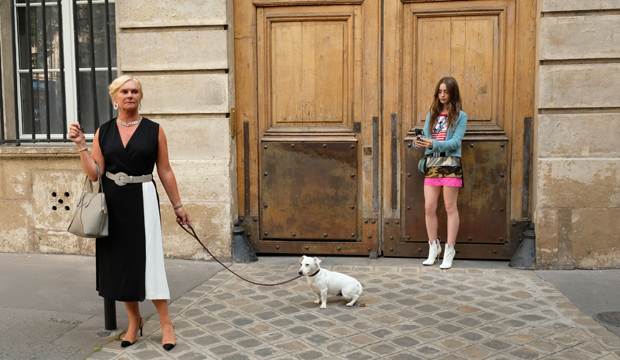
Paris is undoubtedly one of the show's stars. Photo: Netflix
Jen: It's the same team as Sex and the City, so I was excited: Carrie Bradshaw style was my obsession. I did feel disappointed because I was excited for those amazing fashion moments, even if they were inappropriate. In SATC, they were unrealistic but it totally worked. You wanted it, and that wasn't happening here... although I did like Sylvie's style, the Rick Owens, and all of that.
He's done another show, Younger, which is hilarious. It's about a 40-something who pretends to be in her 20s to get a job in publishing, and it made me appreciate that show even more. All of the things that were missing from this - the style, the humour in a lot of ways, the 'new' Sex and the City vibe, the cross-generational insights - are all in that show.
Eleonore: It's completely unrealistic. You can see that Emily is dressed by all the biggest couture brands that you can find, from Chanel to Louis Vuitton and Dior, and you can see that, it's quite blatantly obvious. She also wears the most impossible shoes ever...
I love the scene where at some point she has those amazing shoes and one of the boys takes the shoe off so easily... and you think 'wow', it's feasible. I thought that was hilarious.
I also love that line where Sylvie blurts out that entrenched French belief that Americans lack education, don't speak our language, don't have any culture, aren't refined, all of that... She says it well. The way she conveys that fake female independence that French women are very proud of but sometimes you can see all of the cracks and how they're not interested in a knowing a different approach from America or Britain.
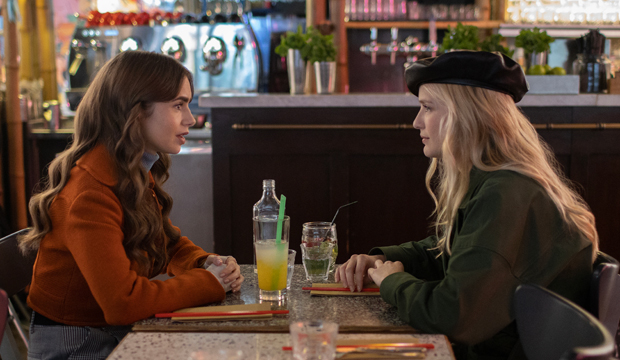
Photo: Lily Collins and Camille Razat. Photo: Netflix
I remember growing up in France feeling that as women, we had it all. We were very independent - women work in France, they work when they have children. It's a bit different in this country, it's a bit different in America. In France, it's not either/or. You can get both. This embodiment of modern women in France, that you can be very feminine but you can be a feminist - all of that could have been studied a little bit more.
The other thing I think was interesting about Sylvie is that she's the different generation - I'm more a Sylvie. This whole dynamic of the two generations could have been interesting and I think Philippine did a good job at portraying that. For me, Lily Collins - she's very pretty and she's very charming and lovely but I couldn't really relate to her, but obviously I'm much older so perhaps that's fair enough.
There is this way of carrying herself around and being full of trust and motivation and quite brave that I quite liked about her.
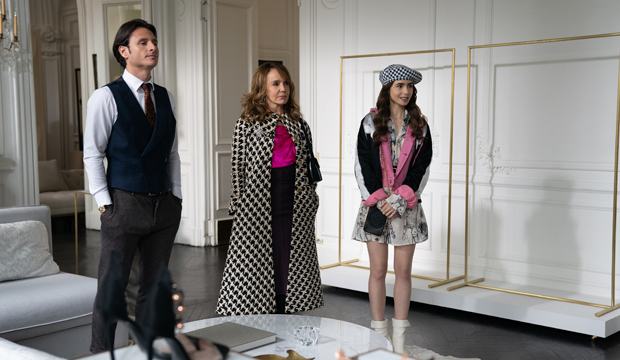
Photo: Netflix
Jen: And there is something universally American about her - my French friend has been texting me saying, 'This show is starring you. This is you!' which is so funny to me because I would never think that. I have four kids, that's not me at all. She has managed to capture that sense of American openness...
Eleonore: She's winning them over no matter what, and I think it's quite endearing. And it works. It's true actually.
Jen: And at the heart of it, both sides have their validity, maybe they both can also learn and grow a little bit. At the end of the day, isn't that what we so need right now? This sense that if we just break down these barriers a little bit, accept a little bit, change our perspective a little bit... I just wish her growth story had been more of that sense of her having to adapt more dramatically to her surroundings...
Eleonore: That didn't go too far, but we get the message.
What about the men? That was the other hilarious part.
Jen: Everyone's in love with the neighbour. He seems to have captured everyone's hearts.
Eleonore: For me that was perhaps the least interesting part. All those men are quite predictable. They're quite old-fashioned in the way they approach things. I don't think they're really reflecting in any way how French men are today. They were a bit slimy. Always very blonde and very white and predictable.
I wondered who the target audience was when I watched this. In French terms, it's like a guilty pleasure. You can see this beautiful city of Paris, and fall in love with it again. But also people are hugging, they're kissing, they're going out, they're partying, which we're all craving. I ended up pouring myself a glass of wine when I was watching the show because it made me want to drink a glass of wine.
What about Americans? Who are the people who want to watch this? Is it people the age of Emily? Older people?
Jen: Well, I think it's everyone - that's one of the special things about it. It's the people who love SATC who want that back, who are now in their 30s, 40s, 50s, 60s. And then I think it's the younger ones - millennials and even teens - dreaming of Paris. The age range is massive to me. All of my mum friends are watching it - American, Dutch, English, French. My single friends - male and female - are watching it. That's why it's so frustrating: how many shows have this level of generational and cultural appeal? We wanted a little more...
Eleonore: It was quite enjoyable and made me have a lovely rainy Sunday afternoon. The 5pm-7pm slot was well-filled by Emily in Paris. I'm quite grateful for that. It's a good light relief. She adapts: she's not as loud, she's not as naive, she learns there are other cultures and other ways to do things and I think that's nice about it.
You can watch the whole conversation between Jen and Eleonore here
Critics - in the US, UK and France - have complained that it's clichéd, ridiculous, lacks diversity and is deeply culturally offensive. However, it's also totally addictive, even if people are hate-watching it, with a viewership that includes teens, their parents, and every Sex and the City fan who was excited about the premise of sex - and Pat Field styling - in another city.
For those who haven't seen it, Emily in Paris centres around Chicagoan Emily, who gets sent to Paris to work for a top French marketing agency when her boss falls pregnant. Clueless about the language and culture, she makes a series of faux pas that sees her branded a plouc (a hick) and ringarde (basic). But Paris is soooo beautiful and Emily's boss, Sylvie (Philippine Leroy-Beaulieu) and friend, Camille (Camille Razat), are soooo stylish, and the men are soooo dreamy...
One reason that Emily's got everyone talking is that it touches on the big cultural divide between France and America. Who better to discuss the show then a Frenchwoman (CW founder Eleonore Dresch) and an American, kids' editor, Jennifer Barton.

Photo: Netflix
Jen: I lived in Paris when I was 23. I studied French literature so I did my year abroad there. I was a sort of Emily figure. I worked - I was doing an internship at WWD there - I was taking acting classes at the Cours Florent doing the acting thing, so I feel I can relate to her a little bit.
I felt sad watching this that the image of Americans in Paris is brazenly going in and not trying to respect the culture or learn the language and that wasn't my approach when I lived there.
The most unrealistic thing, that I found ridiculous, was that all of the French people would be speaking English to each other in front of her. That would never happen. One of the reasons that you end up learning French and picking it up is that no one will ever concede to you in English.
Eleonore: I agree. I've noticed at parties - and there's one episode where it happens, she's invited to a party, and a Frenchwoman comes to her and talks to her in English and she's lovely and she's trying and then another Frenchwoman arrives and they start talking in French and Emily's completely out of the conversation. That's very typical of what would happen.
I thought it was interesting because at the beginning I thought, this is really unpleasant. It's unpleasant for her - I mean, she's really like la plouc, the hick, and she comes with her big smile thinking everyone is on her planet and she's told, 'Sorry darling, we couldn't care any less about you'. I think she's playing the role of the dumb girl and that's pretty harsh on the Americans. It's a bit of a caricature of how the French perceive the Americans, so it's not nice to the Americans and it's not nice to the French obviously - that's also the funny part of it.
And then as the series goes on, Sylvie, who is unbearable at the beginning, you start to like her and you start to see the other side of her, and you can see how she mellows with Emily and vice versa and how they start learning from each other. In the end, there are quite some positive moments, and the idea that the two cultures together can create something wonderful. So I don't think it's that bad, but it's obviously too extreme in many ways.

Lily Collins and Ashley Park. Photo: Netflix
Jen: Everyone's so engaged with it: Brits, Americans, the French. So on some level, even though people are hate-watching it, there is an element where people are seeing it through and there is something compelling about it.
Eleonore: I agree. Going back to my own experience - I'm not Parisian, I grew up in the south of France and I moved to Paris and lived there for five years and had a lovely time there. Then I moved to London.
What is interesting for me is when I go back to Paris where I have family and friends, when I'm invited to parties, I realise - because obviously I feel French when I go to parties but I don't really behave like a Frenchwoman anymore - I'm a little bit like Emily.
I go up to people with a big smile and say, 'Hi, who are you? I'm interested in knowing a bit more about you' and Parisian people are like, 'Who are you? Should we be talking to each other? It's not because we speak the same language that we should be friends, right?'
It's quite funny because you suddenly realise you have to be vetted - definitely in Paris. You can't arrive and be this lovely person. It's not because you have a big smile and perhaps an interesting job that they're going to be interested in you. You have to gain their attention and patience and they're quite protective. And then, interestingly, when you pass that level, they're actually extremely friendly.
You have to look the part. You have to have the right look - it doesn't matter exactly which look, but there has to be some storytelling. There's an element of vulgarity and commonness that is something you have to be wary of. The way you dress has to be quite precious and original, not bland and mainstream. Not too obvious in terms of trying to make friends. You have to have your pride.
But in the end, if you persevere, you get there. And there's always someone who's open. The other thing about Paris is you have way more French people who lived abroad and opened their minds and actually realise there are other ways of being pretty or being bright, of seeing the world that is as convincing and as enticing as their own.
I thought the fashion was obviously atrocious, but I think it's meant to be like that, it's meant to be completely OTT. But it's a shame because it could have been an opportunity to be quite inspired by the way they look and you're never really quite there. I know there have been a lot of references to Sex and the City but to me it's more like Gossip Girl, the way they dress. How did you feel about that?

Paris is undoubtedly one of the show's stars. Photo: Netflix
Jen: It's the same team as Sex and the City, so I was excited: Carrie Bradshaw style was my obsession. I did feel disappointed because I was excited for those amazing fashion moments, even if they were inappropriate. In SATC, they were unrealistic but it totally worked. You wanted it, and that wasn't happening here... although I did like Sylvie's style, the Rick Owens, and all of that.
He's done another show, Younger, which is hilarious. It's about a 40-something who pretends to be in her 20s to get a job in publishing, and it made me appreciate that show even more. All of the things that were missing from this - the style, the humour in a lot of ways, the 'new' Sex and the City vibe, the cross-generational insights - are all in that show.
Eleonore: It's completely unrealistic. You can see that Emily is dressed by all the biggest couture brands that you can find, from Chanel to Louis Vuitton and Dior, and you can see that, it's quite blatantly obvious. She also wears the most impossible shoes ever...
I love the scene where at some point she has those amazing shoes and one of the boys takes the shoe off so easily... and you think 'wow', it's feasible. I thought that was hilarious.
I also love that line where Sylvie blurts out that entrenched French belief that Americans lack education, don't speak our language, don't have any culture, aren't refined, all of that... She says it well. The way she conveys that fake female independence that French women are very proud of but sometimes you can see all of the cracks and how they're not interested in a knowing a different approach from America or Britain.

Photo: Lily Collins and Camille Razat. Photo: Netflix
I remember growing up in France feeling that as women, we had it all. We were very independent - women work in France, they work when they have children. It's a bit different in this country, it's a bit different in America. In France, it's not either/or. You can get both. This embodiment of modern women in France, that you can be very feminine but you can be a feminist - all of that could have been studied a little bit more.
The other thing I think was interesting about Sylvie is that she's the different generation - I'm more a Sylvie. This whole dynamic of the two generations could have been interesting and I think Philippine did a good job at portraying that. For me, Lily Collins - she's very pretty and she's very charming and lovely but I couldn't really relate to her, but obviously I'm much older so perhaps that's fair enough.
There is this way of carrying herself around and being full of trust and motivation and quite brave that I quite liked about her.

Photo: Netflix
Jen: And there is something universally American about her - my French friend has been texting me saying, 'This show is starring you. This is you!' which is so funny to me because I would never think that. I have four kids, that's not me at all. She has managed to capture that sense of American openness...
Eleonore: She's winning them over no matter what, and I think it's quite endearing. And it works. It's true actually.
Jen: And at the heart of it, both sides have their validity, maybe they both can also learn and grow a little bit. At the end of the day, isn't that what we so need right now? This sense that if we just break down these barriers a little bit, accept a little bit, change our perspective a little bit... I just wish her growth story had been more of that sense of her having to adapt more dramatically to her surroundings...
Eleonore: That didn't go too far, but we get the message.
What about the men? That was the other hilarious part.
Jen: Everyone's in love with the neighbour. He seems to have captured everyone's hearts.
Eleonore: For me that was perhaps the least interesting part. All those men are quite predictable. They're quite old-fashioned in the way they approach things. I don't think they're really reflecting in any way how French men are today. They were a bit slimy. Always very blonde and very white and predictable.
I wondered who the target audience was when I watched this. In French terms, it's like a guilty pleasure. You can see this beautiful city of Paris, and fall in love with it again. But also people are hugging, they're kissing, they're going out, they're partying, which we're all craving. I ended up pouring myself a glass of wine when I was watching the show because it made me want to drink a glass of wine.
What about Americans? Who are the people who want to watch this? Is it people the age of Emily? Older people?
Jen: Well, I think it's everyone - that's one of the special things about it. It's the people who love SATC who want that back, who are now in their 30s, 40s, 50s, 60s. And then I think it's the younger ones - millennials and even teens - dreaming of Paris. The age range is massive to me. All of my mum friends are watching it - American, Dutch, English, French. My single friends - male and female - are watching it. That's why it's so frustrating: how many shows have this level of generational and cultural appeal? We wanted a little more...
Eleonore: It was quite enjoyable and made me have a lovely rainy Sunday afternoon. The 5pm-7pm slot was well-filled by Emily in Paris. I'm quite grateful for that. It's a good light relief. She adapts: she's not as loud, she's not as naive, she learns there are other cultures and other ways to do things and I think that's nice about it.
You can watch the whole conversation between Jen and Eleonore here
TRY CULTURE WHISPER
Receive free tickets & insider tips to unlock the best of London — direct to your inbox